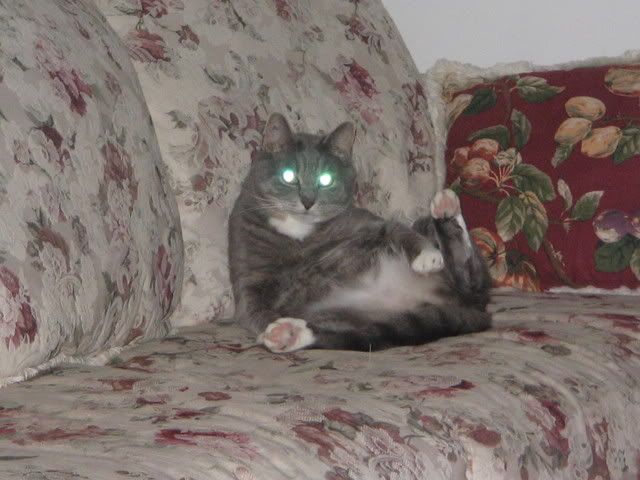Thanks for the prayers.

Medusa wrote:
Wow, I didn't realize the kidneys were as small as kidney beans! I knew they were kidney bean shaped though.

What caused the intestinal blockage? I was wondering about that and thought maybe it could be the reason he is throwing up.
The weird thing is that he doesn't vomit up food, just water. He drinks alot of water and has for the 6 years I've had him. He has been on pred for most of that time though too and that causes excess thirst. And, now that we know he has one working kidney, that could explain the thirst too.
Pinot's mom wrote:
I really didn't know anything about lungworm before this either. But I'm learning lots now!

Randi wrote:
Thanks Randi! I'm heading into town early next week to pick up the meds for all the cats and will post an update afterwards if anything changes with them.
Lizzie wrote:
Was it wheezy sounds that the cat was making? Jimmy makes a wheezing sound off and on. It's not too loud but you can hear it from a few feet away. Maybe I'll try and tape it and post it here. George also makes very wheezy sounds. I've had every test you can imagine done on that cat (George) and no vet has been able to figure him out. He's actually had a cat scan, it cost a fortune. They sent the results to a university in Colorado for some specialist to evaluate and nothing could be seen in his nasal passages. They did a biopsy of his nasal passage tissue and the only result of that was that the tissue was somewhat 'inflammed' but they couldn't determine from what. He didn't have a fever and no infection, though they tried him on a few antibiotics. I had his blood tested and sent to a california allergy testing lab and it came back saying he was allergic to wheat, rice, turkey, dairy and pork, just about every cat food out there! But he is currently on a food called NOW and it is grain free. Before that, he was on Taste of the Wild, neither food relieves his wheezing. We've tried every litter you can imagine and it doesn't help. We've tried air purifiers in his room too and it doesn't help. So maybe it is lungworm. I'm just so worried that after years of wheezing (3.5 years) that if it is lungworm, that maybe damage has been done. He still is very playful and seems to enjoy life but I would be over the moon if I could help him breathe better. And Jimmy. It would be such a gift. (Ollie doesn't wheeze but he has these coughing spells).
Kater wrote:
I brought Jimmy into the vet a few months back because he became very ill and was pooping alot of blood. They did a fecal float then but not the test you mentioned for lungworm. He ended up having xrays and then an ultrasound and it was found that he was fighting an infection in his bowel. He was put on Metronidazole for about a month and we switched him to Hypo Gastro food and he is doing really well with his IBD and making normal poops. It's the first time in 6 years so we are so thrilled.

I brought Jimmy in again a month or so ago because he was throwing up water. I think this has been going on for longer though but he does it in the litter box so I didn't know. I just happened to catch him doing it one day and since then I sneak up on him every time I see him in the litter box. He is not thrilled with this new program. lol And on occasion, he throws up on the floor near the litter box and it's just water.
The other thing he does is cough, but not an open mouth cough. It's just a little cough, almost like a hiccup but he does it alot now. The vet did xrays and showed me the donut things in his lungs and figured that it was bronchitis and that was causing him to cough, which she thought in turn was causing the vomitting. She upped his dosage of pred and expected the coughing and vomitting to stop. Then when I called her last week, she talked about the possibility of lungworm. I don't want to get him xrayed further but do you think the donut things on the xrays already done could be caused by lungworm? That's what I'm wondering about.
With regard to heartworm, we don't have it in the southern part of B.C. and Jimmy was a stray found in Southern B.C. and we also live in the southern part as well. The other cats come from the south too. But maybe Jimmy belonged to someone at some point in the northern part who moved to the southern part and then abandoned him or maybe he just ran away. Hmmmmm, I wonder.
Does heartworm show up on an xray? I know there is a heartworm test but just wondering if my vet had another look at the xrays if she could see anything in his heart.
I don't think Jimmy is in late stage kidney failure because the vet ran a complete blood panel on him a few months ago and all his organs were functioning normally, including his one kidney. She was a bit surprised by this but thought it was great. I remember her saying that he had a kidney stone in his kidney though but she felt it wasn't an issue. Maybe that is what is causing the vomitting. I know someone suggested this to me in another post a few months back and I did run it by the vet but she doesn't think there is a connection.

I'll be picking up the panacur early next week and will post afterward. Do you happen to know if they are infected with lungworm if they will throw up alot after the meds?










 Reply With Quote
Reply With Quote



 He's oh-so-cute and modest.
He's oh-so-cute and modest. 


 The standard-sized housecat's healthy kidney is somewhere in the range of 2-4 inches long (This is an estimate from my memory, we normally measure kidneys as a ratio of the size of a particular vertebrae in cats). Anyway, bigger than a kidney bean! That's why veterinarians can palpate them on physical examination (assuming the kitty is not too chubby).
The standard-sized housecat's healthy kidney is somewhere in the range of 2-4 inches long (This is an estimate from my memory, we normally measure kidneys as a ratio of the size of a particular vertebrae in cats). Anyway, bigger than a kidney bean! That's why veterinarians can palpate them on physical examination (assuming the kitty is not too chubby).
Bookmarks